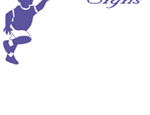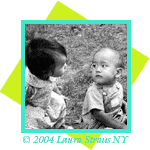|
First Signs launched the Minnesota pilot program in 2003-2004 in collaboration
with the Minnesota Department of Education (MDE), the University of Minnesota,
the Autism Society of Minnesota (AuSM), and the Minnesota Department of Health.
The following provides information about the program and the follow-up evaluation
study. We provide links to articles in the press and to numerous Web-related
disability resources for Minnesota.
Minnesota First Signs Program
Minnesota Evaluation Study
Minnesota First Signs in the News
Minnesota Disability Resources
A Pediatric Practitioner's Guide to Early Childhood Intervention in
Minnesota.
(PDF brochure:
outside panels |
inside panels)
Minnesota First Signs Program
Minnesota First Signs was launched in April 2003. The Minnesota
Department
of Education (MDE), Autism Society of Minnesota (AuSM), Minnesota
Department
of Health, University of Minnesota, and First Signs, Inc. collaborated in this
statewide initiative. The Minnesota First Signs model differed significantly
from the previous New Jersey First Signs pilot. Instead of offering a self-paced
independent study, the Minnesota First Signs model
offered live training seminars to medical practitioners, clinicians, and early
childhood educators.
The Minnesota First Signs program was funded by:
- Minnesota
Department of Education
The Minnesota First Signs program was endorsed by:
- American Academy of Pediatrics/MN Chapter
- Minnesota Academy of Physician Assistants
- Minnesota Academy of Family Physicians
The objectives of the Minnesota First Signs program were to:
- Increase knowledge of early warning signs among pediatric practitioners
in Minnesota
to raise their level of awareness
- Improve frequency and quality of screening young children
- Facilitate timely referral of children in Minnesota to local Early Intervention
programs
- Lower the age at which children are identified with autism and other developmental
disorders in Minnesota
The Minnesota First Signs program consisted of:
- Press campaign
- Mailings to more than 4,000 physicians, clinicians, and early childhood
educators inviting them to participate in a live training seminar, receive
continuing education
credits, and a free First Signs Screening Kit
- 3 training
workshops and 2 Grand Rounds
- 3 Early Childhood Intervention train-the-trainer workshops (provided PowerPoint
slides, handouts, and First Signs Screening Kits
to participants)
- Live and archived Webcast for continuing education credits
- Public Service Announcements (PSAs)
- Parent outreach, consisting of telephone support for parents looking for
help
or referrals
- Page on our Web site dedicated to MN resources
Minnesota Evaluation Study
The evaluation study is being conducted by First Signs.
Evaluation questions
- Are influencing pediatric practice?
- Are we improving screening by medical practitioners?
- Are we improving referral of children to Early Childhood Intervention
programs?
Evaluation strategy
- Compare results from pre- and post-tests to measure
knowledge gained from a single training session
- Monitor visits to dedicated
MN Web pages
- Compare annual changes in referral rates to MN Early
Childhood Intervention
Evaluation Results
The Minnesota First Signs program has trained over
500 medical practitioners in live presentations and an additional 134 practitioners
through
our Webcast.
58% turned in completed pre- and post-tests, with 76% agreeing to participate
in a two-year follow up efficacy study. Over 60% improved upon their test scores
from pre to post tests.
First Signs provided outreach training to 130 professionals including Early Childhood
Intervention staff and Autism Resource Specialists from all regions of the state
who expanded the training for local outreach efforts. They, in turn, have trained
an additional 685 physicians and medical practitioners. Further training has
been provided for more than 3,238 early childhood professionals and community
providers across the state.
Physicians with the MN Chapter of the AAP: Committee for Children with Disabilities
have begun incorporating First Signs information into physician training programs
at the University of Minnesota.
Screening kits have been distributed to over 900 practitioners and clinics statewide.
Over 2% of First Signs’ monthly Web traffic can be tracked to Minnesota.
Initial Minnesota Child Count data from December 1, 2003 indicates a significant
increase in identification of children with autism in the age groups under age
6 and more importantly for those under age 3. While they are still small numbers
and open to interpretation, the most notable difference is a 75% increase in
the number of young children identified in the 0-2 age group from 2002 until
2003. The overall increase in identification of ASD for all children 0-21 in
the same period was 23%. The rate of increase for the 0-2 group from 2001-2002
was 40%. The overall increase in identification of ASD for all children 0-21
in 2001-2002 was 27%.
These are only a few small measures of the possible effectiveness of the Minnesota
First Signs initiative.
Minnesota First Signs in the News
| Autumn 2004:
|
First Signs Model Program Makes Great Strides in Early Detection
in Minnesota: Clinicians and Educators Play Major Role in Increased Screenings
AAP Behavioral and Developmental News, Autumn 2004,
Pages 20-22 |
| May 5, 2003: |
Autism Screening Program Launched By State
(PDF)
Minnesota Physician MedFax, Vol. 10, Number 29, May 5, 2003 |
| April 28, 2003: |
First Signs
Press Release:
National Model
Statewide Campaign to Educate Parents, Physicians About Early Warning Signs
of Autism Will be Launched in Minnesota |
| April 25, 2003: |
Minnesota
First Signs
Fact Sheet:
Minnesota
Statewide Program to Educate Medical Professionals on Screening for Autism
Spectrum Disorders |
| April 25, 2003: |
Minnesota MDE Press Release:
MDE to Use Federal Funds for Early Autism Identification Effort |
To read all news articles related to First Signs, visit our
Press
Center.
|




